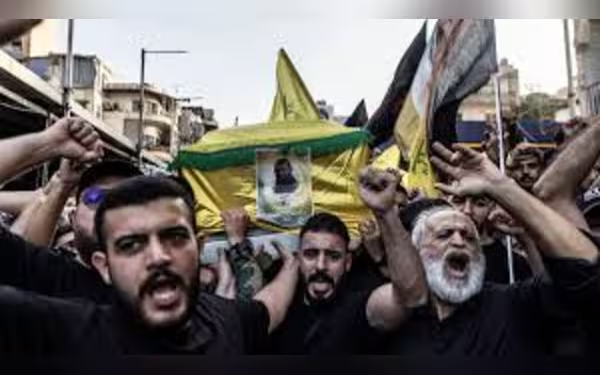Saturday, November 16, 2024 05:54 PM
Hezbollah's Resilience Amid Military Setbacks: US Intelligence Insights
- Hezbollah remains operational despite military degradation.
- Israeli forces face challenges neutralizing Hezbollah's strength.
- Hezbollah's international attack capabilities largely unaffected.
 Image Credits: thefrontierpost
Image Credits: thefrontierpostUS intelligence warns Hezbollah is operational despite military losses, posing ongoing challenges for regional stability.
In recent developments concerning the ongoing conflict in the Middle East, a top US intelligence official has provided insights into the current state of Hezbollah, a Lebanese militant group. This group, which has been heavily armed and funded by Iran, has faced significant military challenges, particularly in its confrontations with Israel. The situation has escalated since the outbreak of violence on October 8, 2022, following a Hamas attack on Israel, leading to a broader conflict that has affected not only Israel but also Lebanon and Gaza.
Brett Holmgren, the acting Director of the National Counterterrorism Center, stated that while Hezbollah's military capabilities have been notably degraded due to Israeli military actions, the group is still very much operational. He remarked, "It still remains down, but far from out." This indicates that despite suffering losses, Hezbollah retains a substantial ground force along the Israel-Lebanon border, which remains largely intact.
Holmgren emphasized that Hezbollah had built a massive arsenal of rockets and missiles prior to the recent conflict, which has allowed them to maintain a level of operational capability. He noted, "They were starting at a very strong point," highlighting the challenges faced by Israeli forces in completely neutralizing Hezbollah's military strength.
Since the beginning of the conflict, Hezbollah has claimed to have killed at least 100 Israeli soldiers and wounded around 1,000 more. However, the group has not disclosed the number of its own fighters who have died, with estimates suggesting that the figure exceeds 1,000. The Israeli military has also targeted and eliminated key leadership figures within Hezbollah, including those who were instrumental in the group's formation during the Israeli invasion of Lebanon in 1982.
Holmgren pointed out that the loss of leadership has impacted Hezbollah's ability to organize and strategize effectively. Nevertheless, he noted that the ground forces in southern Lebanon remain somewhat intact, indicating that the group still possesses the means to conduct operations.
Moreover, Holmgren warned that Hezbollah's capabilities for conducting attacks outside of Lebanon have largely remained unaffected. He specifically mentioned the Islamic Jihad Organization and other external components of Hezbollah as having suffered minimal impact thus far. This suggests that while Hezbollah may be facing challenges on the battlefield, its ability to operate internationally remains a concern.
In the context of the ongoing conflict, Holmgren also highlighted the situation in Gaza, where Hamas, a key ally of Hezbollah, continues to recruit new members. He stated that even a diminished Hamas is adapting its tactics, turning to small arms and hit-and-run strategies. The recruitment of new fighters is likely to persist as long as there are no viable political alternatives for disaffected youth in Gaza.
The situation surrounding Hezbollah and its operations remains complex and fluid. While the group has faced significant military setbacks, its ability to regroup and adapt poses ongoing challenges for regional stability. The urgent need for viable political solutions in Gaza and Lebanon cannot be overstated, as addressing the root causes of discontent may ultimately undermine the appeal of militant groups like Hamas and Hezbollah. As the conflict continues to evolve, the international community must remain vigilant and proactive in seeking pathways to peace and stability in the region.













